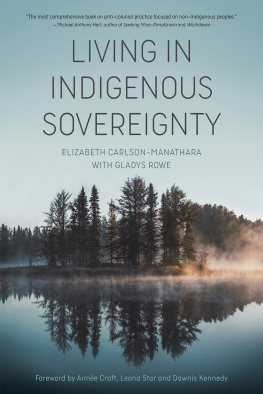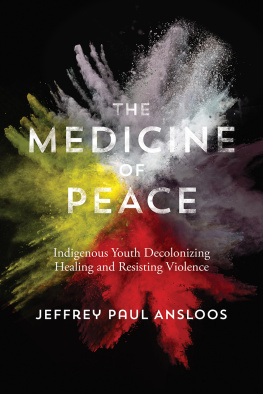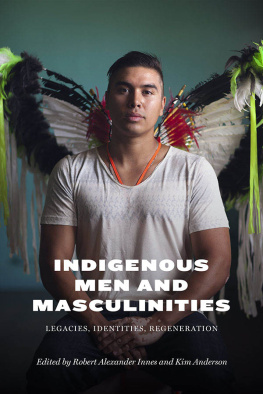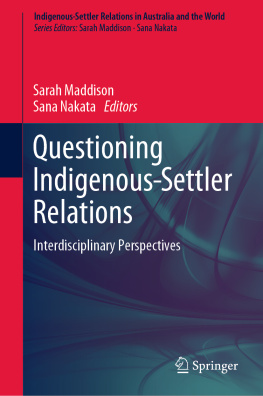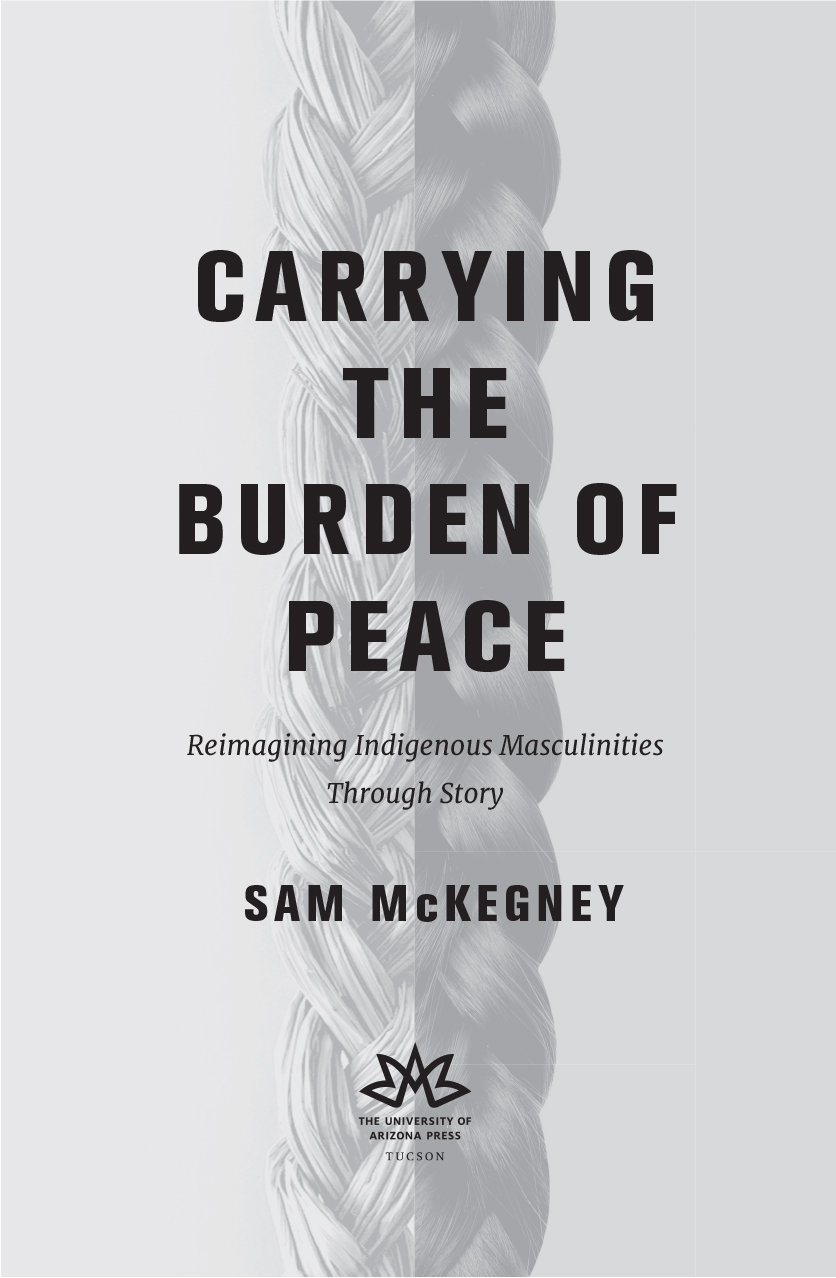Advance Praise for Carrying the Burden of Peace
There has been much debate in scholarly and community settings in recent years as to whether the examination of Indigenous masculinities might be one that celebrates rather than pathologizes. McKegney does not shy away from these debates and the players involved, and in so doing, takes risks in the service of holding place for decolonial men and masculinities. Beautifully written, his book is courageous, critical, and unique in terms of advancing discussions about critical Indigenous masculinities in the academy and community alike. Kim Anderson , co-editor of Indigenous Men and Masculinities and Keetsahnak: Our Missing and Murdered Indigenous Sisters
As a settler-scholar, McKegney cogently narrates the political minefield that Indigenous Masculinities has become. Brendan Hokowhitu , co-editor of Indigenous Identity and Resistance
A smart, thoughtful, and deeply considered work of intellectual and ethical import. I came away from the manuscript convinced of the need for this work, as I find it exemplary of the kind of careful, ethically attentive, and deeply generous scholarship we need more of. Daniel Heath Justice, author of Why Indigenous Literatures Matter
With deep respect and thorough, nuanced analysis, Sam McKegney uncovers the traumas and resilience of Indigenous masculinities through the beauty of voice and narrative providing a much-needed perspective in Indigenous literary studies. Niigaanwewidam James Sinclair, co-editor of M anitowapow: Aboriginal Writings from the Land of Water
This book represents an essential contribution to scholarship in Indigenous masculinities. As McKegney maps out, we sit at a precarious moment in the field. There have been ruptures of trust and significant questions raised about the efficacy of critical masculinity studies as a viable mode of scholarly inquiry. Carrying the Burden of Peace very deliberately engages these questions and persuasively argues for the vital necessity of such work.... It is beautifully written, meticulously centered in current critical discourses in Indigenous studies, and offers an important addition to the ongoing scholarly conversations in Indigenous masculinities studies. Lisa Tatonetti, author of The Queerness of Native American Literature
The University of Arizona Press
www.uapress.arizona.edu
2021 Sam McKegney
All rights reserved. Published 2021
ISBN-13: 978-0-8165-3703-7 (paper)
Cover and Text design by Duncan Noel Campbell, University of Regina Press
Cover images: Braided sweetgrass by Duncan Noel Campbell, and Braided hair by Adobe Stock.

This edition has been published by arrangement with University of Regina Press, Regina, Saskatchewan, S4S 0A2 Canada. www.uofrpress.ca.
Library of Congress Control Number: 2021931608
Printed in the United States of America
This paper meets the requirements of ANSI/NISO Z39.48-1992 (Permanence of Paper).
With unending gratitude and respect,
this book is dedicated to the memories of
Jo-Ann Episkenew,
Basil H. Johnston,
and
Thomas Kimeksun Thrasher,
mentors, storyweavers, visionaries.
Contents
Burdens and Bundles: An Introduction
How do we ensure every Indigenous body, honored and sacred knows respect in their bones? leanne betasamosake simpson ( As We Have Always Done 51)
C an a critical examination of Indigenous masculinities be an honour songone that celebrates rather than pathologizes; one that holds people and institutions to account but seeks diversity and strength rather than evidence of victimry; one that struggles to overturn heteropatriarchy without centring settler colonialism; one that validates and affirms without fixing the terms of engagement? Can a critical examination of Indigenous masculinities be an embodied enterprise? Be creative? Be inclusive? Be erotic? Be funny?
Countering the perception that masculinity has been so contaminated by settler heteropatriarchy as to be irredeemable, in this book I examine Indigenous literary art to illuminate the potential generativity of Indigenous masculinities as rubrics for decolonial theorizing. My argument is simple: if we understand masculinity as pertaining to qualities connected in some way with maleness, and we recognize that there are individuals within Indigenous families, communities, and nations who identify as male (or with masculinity regardless of biological sex), then the concession that masculinity pertains only to negative characteristics inherited from settler colonialism bears stark consequences. It means that the resources available to affirm those subjectivities will be constrained and perhaps even contaminated by shame, which is why, in the words of enrolled Cherokee scholar Daniel Heath Justice, literature ought to give us alternatives (Fighting 145). In Carrying the Burden of Peace , I pursue imaginings of masculinity that exceed settler colonial logics and can be conscripted in the service of neither heteropatriarchy nor Indigenous dispossession. Ultimately, I contend that masculinities can indeed be included among the resources called upon to help ensure every Indigenous body... knows respect in their bones (Simpson, As We 51)but only if they are liberated from biological determinism, anthropocentrism, and the putative relationships among gender, race, and power that have come to be naturalized in contemporary North American society.
In As We Have Always Done: Indigenous Freedom through Radical Resistance , Michi Saagiig Nishnaabeg theorist Leanne Betasamosake Simpson voices her refusal to concede, in the raising of her children, to coercive gendering practices that serve as instruments of colonial control. Writing within the context of Anishinaabe intelligence, Simpson declares that my child has a responsibility of figuring out a meaningful way to live in the world that is consistent with her most intimate realities. The job of everyone else is not to direct or control but to support her (120). Here I will describe the coherence that Simpson champions between intimate realities and ways of being in the world as integrity: personal, experiential, and embodied knowledge of the self, which enables one to persist in ways that are expressive of ones own truth with neither posturing nor denial; such integrity is cultivated when ones full humanity is honoured and respected by those around them, enabling meaningful integration into the family, community, and nation; it is affirmed through recognition that one is indeed integral to those very systems of relation. Settler colonialism endeavours to destroy the fabric of Indigenous nationhoods by attempting to destroy our relationality by making it difficult to form sustainable, strong relationships with each other (Simpson, Not Murdered). Stories of personal integrity and wholeness, like many of those analyzed in this book, provide maps for weaving together intimate realities with meaningful way[s] to live in the world. They provide the connective tissue that draws the full, unfettered humanity of Indigenous individuals into families, communities, and nations in consensual, generative, and mutually nourishing ways. Indigenous masculinities, I argue in this book, are among the imaginative resources that can be gleaned from Indigenous literary art to facilitate these processes.
I tend to think of masculinities as tools for describing the qualities, actions, characteristics, and behaviours that accrue meaning within a given historical context and social milieu through their association with maleness, as maleness is normalized, idealized, and even demonized. Particularities of culture and history inevitably inform the makeup of the web, and movement between social contexts causes particular threads to gain prominence or to recede into the background as masculinities are conceived and expressed differently in kitchens, workplaces, classrooms, bars, and bedrooms. Yet what comes to be considered masculine within a given context bears a weight of accreted meanings that necessarily falls short of capturing the complex experiences of individual men (or others), even as those meanings continue to influence how peoples identities are lived and understood. the old people would say. It is not to be taken lightly for the consequences are great and, if used improperly, often fatal (1). As social constructs in a volatile and oppressive reality informed by settler colonialism, masculinities can carry the weight of and perpetuate oppression, but they are not doomed to be always and only negative. To deny the beauty, vulnerability, and grace that can be expressed and experienced as masculinity is to concede to settler colonialisms myopic vision of the world; it is to eschew the creativity that is among our greatest gifts. This book weaves together stories of Indigenous life, love, eroticism, pain, and joy as teachings that articulate more complex, diverse, and human understandings of Indigenous masculinity than those inherited from settler colonialism, in the hope that the bundles of Indigenous boys, girls, diversely gendered youth, and others will not be impoverished of medicines in this world conditioned by settler heteropatriarchy. These are stories that explore and critique and create masculinities that might be of value or might be of harm, and they are stories that foster the knowledge to understand the difference. As Anishinaabe writer Kateri Akiwenzie-Damm argues, such storywork is necessary for cultivating conditions in which her sons will be able to find a wider range of depictions of Indigenous men that will maybe inspire them... and teach them both in that Nanabozho way of what to do and what not to do.... Theyll have more to draw on than I think Indigenous men have had in the past few generations (Affirming Protectorship 181).
Next page


